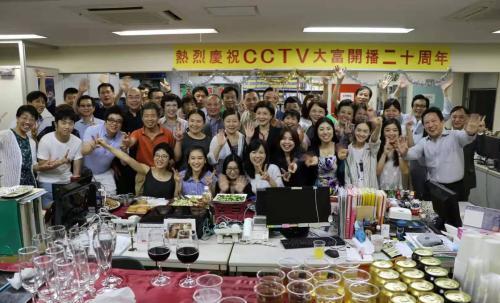Tokyo, October 3 (China News Service) -- Recently, Zhang Liling, president of Japan's "CCTV Dafu" television station, told reporters in Tokyo that in today's all-media era, Chinese-language media are facing many challenges, and while applying new technologies, they still have to adhere to the principle of "content is king."

Data chart: 2018 CCTV Dafu launched the 20th anniversary of the company's party
Zhang Liling said that in the era of global development of networking, the regional media development of various countries must not only find its own sense of existence in the dissemination of massive information, but also compete with a large number of self-media and social media.
She said that Chinese media do face many challenges, but we must adhere to the concept of "content is king", select or produce excellent content, coupled with localization, in the face of Chinese audience readers in the host country with special attributes, we must cooperate with the mainstream to create unique media and content.
According to her, in 1998, Japan's most representative media and enterprises (Okura Corporation Group, Fuji Tv, Kyocera Group, Dentsu Group, ADK Group, Sony Group) jointly funded the establishment of Dafu Co., Ltd., which landed China Central Television overseas, and the only "CCTV Dafu" channel with the title of "CCTV" was successfully launched throughout Japan, which was called "epoch-making media bridge" by the Japanese media.
In February 2012, "CCTV Dafu" realized localization bilingual broadcasting and entered the three mainstream broadcast platforms in Japan. Zhang Liling told reporters that the current competition is very large, and the Chinese media in Japan need to show unique advantages in order to attract audiences and readers. Expanding the influence on the mainstream is also the way to survive and develop, and it is necessary to consider combining with the mainstream to achieve localization or partial localization. In addition, it is also necessary to find the media's own business model and profit model, and build the media's self-hematopoietic function, which is the guarantee of continuous development and sustainable operation.
Zhang Liling stressed that "CCTV Dafu" has always adhered to the concept of "content is king", and at the beginning of the establishment of the TV station, it was filming a ten-episode large-scale documentary "Our Study Abroad Life - Days in Japan". After the launch of CCTV Dafu, in order to expand the influence of the channel and increase the audience, Zhang Liling and her colleagues opened the newspaper "Dafu Bao" and the Dafu website, actively participating in various Sino-Japanese cultural exchange activities, and the selected content coupled with colorful forms greatly enhanced the reputation and influence of "CCTV Dafu".
In terms of telling Chinese stories well and promoting Sino-Japanese friendship, Zhang Liling believes that it is necessary to focus on the true and touching stories of friendly exchanges between ordinary people between China and Japan in terms of expression and communication channels suitable for the Japanese people, highlight the documentary style and its charm, and use the narrative method of small and simple to penetrate the big themes.
The large-scale Sino-Japanese co-production and broadcast project "China Story", which was launched in 2017, has been successfully produced in two seasons and seven episodes, and has been broadcast in the ace documentary column "Documentary" of Fuji TV in Japan, which has achieved good ratings and has been widely praised.
"This is the fruit of CCTV's efforts to cultivate the mainstream society in Japan for more than 20 years, and it is also a good reward for adhering to the principle of 'content is king'." Zhang Liling said. (End)